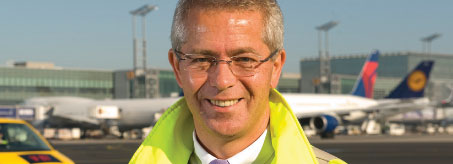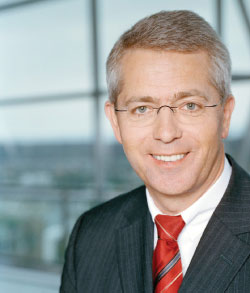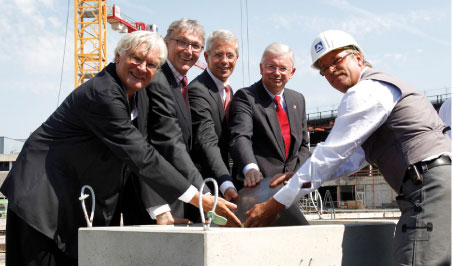
Schulte: “We can’t just stand still in a very competitive marketplace. Fraport has excellent location and operational advantages to offer the airlines – and soon more runway capacity that we need to market more intensively in the future.”
Previously serving as Fraport’s chief financial officer and vice chairman of the executive board with responsibility for the airport’s €4 billion Airport Expansion Programme (AEP), Schulte remains focused on positioning the airport for long-term growth.
Construction of a fourth (northwest) landing runway and third terminal remains high on the agenda. “My new role is really a matter of continuity as well as change. There are three key focus areas for the executive board: to steer the company and Frankfurt successfully through the turbulent economic and financial crisis, to ensure Frankfurt Airport’s future viability and competitiveness by expanding the airport quickly – particularly the new runway – and to become even more customer responsive and customer orientated,” he said.

Dr Schulte joined Fraport six years ago, initially serving as Fraport’s chief financial officer and vice chairman of the executive board, with responsibility for the airport’s €4 billion Airport Expansion Programme (AEP).
Construction of the new Runway Northwest began in May, with completion expected in time for the airport’s 2011 winter timetable. “When Runway Northwest is operational, we will be able to increase our total runway capacity incrementally by more than 50%. Maximising the potential of Frankfurt Airport’s new capabilities will be vital,” said Schulte.
In 2012, a new Pier-A Plus will be opened for passengers using Terminal 1 – ahead of the anticipated opening of Terminal 3. Commenting on the project, Schulte said: “On my first day as chairman, we celebrated the foundation stone laying for the new Pier A-plus at Terminal 1. The project will add capacity for an additional six million passengers per year.”
Economic challenges
Frankfurt Airport’s traffic is continuing to develop positively. In August, the airport recorded throughput levels of 4.9 million passengers – down 0.4% year-on-year and Schulte is optimistic that the airport’s ongoing expansion plans can be delivered to help meet its target of serving 88 million passengers by 2020: “The big challenge is to master all of these goals at once, but Fraport is fit for the task. Because of the current traffic situation we recently decided to push back construction of the first phase of Terminal 3 by two to three years – but our plans for the terminal are ready and can be implemented any time, depending on traffic demand.”
Serving as the main European hub for the Star Alliance and as an important intercontinental hub for Germany, Frankfurt’s new runway will be vital for increasing the airport’s share of the global network. “We offer more destinations than any other airport in Europe, but we can’t just stand still in a very competitive marketplace.
Fraport has excellent location and operational advantages to offer the airlines – and soon more runway capacity that we need to market more intensively in the future,” said Schulte.

“On my first day as chairman, we celebrated the foundation stone laying for the new Pier A-plus at Terminal 1. The project will add capacity for an additional six million passengers per year.”
Earlier this year Air India designated Frankfurt as its European hub. On 17 September airBaltic started up operations, with a daily non-stop service to Riga and Frankfurt will also be the home base for Lufthansa’s fleet of A380s.
Outlining his long-term vision for building capacity and new services, Schulte said: “Our long-term expectations have not changed. We have more demand for traffic slots than we can offer airlines. With the expansion of the airport, extensive modernisation and enlargement of existing facilities, we are increasing the competitiveness of Frankfurt Airport as one of the world’s most efficient air traffic hubs. We see opportunities everywhere – particularly Asia, the Middle East and Africa regions – where Frankfurt and Fraport is already well-positioned. More destinations in China and India, as well as other Asian countries, also need to be part of our global network.”







